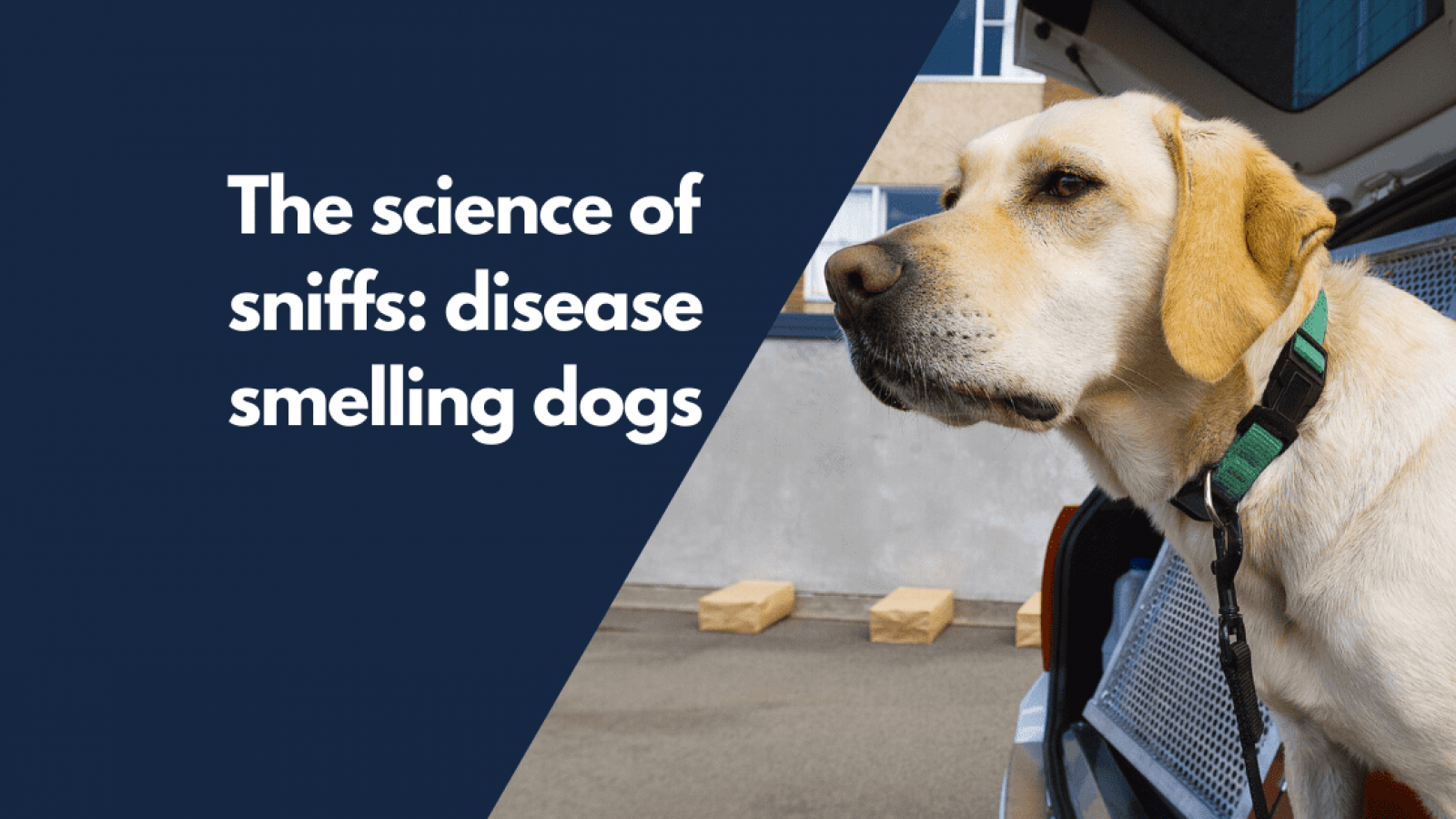Text to go here...
Dogs have been trained to detect a dozen human diseases and most recently, COVID-19.
Dogs are famously known for their sense of smell. Their genetics and physiology make them perfectly suited for sniffing. Dogs have so many more genes that code for olfactory ability, and many more olfactory nerve cells than humans. And for centuries now, humans have taken advantages of this exquisite sense of smell to hunt, search and detect drugs and explosives and now diseases.
With about 220 million scent receptors – humans only have 5 million - dogs can smell things that seem unfathomable to us. Dogs have smell receptors 10,000 times more accurate than humans', which means their nose is powerful enough to detect substances at concentrations of one part per trillion - a single drop of liquid in 20 Olympic-size swimming pools!
Smelling in stereo
Not only that, but dogs also inhale up to 300 times per minute in short breaths, meaning that their olfactory cells are constantly supplied with new odour particles. AND their noses differentiate between right and left.
Dogs’ sense of smell is so subtle that they can notice the slightest change in human scent caused by disease. The tiniest shifts in hormones or volatile organic compounds released by diseased cells can be picked out by dogs. Consequently, dogs have been trained to sniff out the markers of disease that might even go unnoticed with medical tests.
Dogs can help disease diagnosis
Dogs are most famously known for detecting cancer. They can be trained to sniff out a variety of types including skin cancer, breast cancer and bladder cancer using samples from known cancer patients and people without cancer.
In a 2006 study, five dogs were trained to detect cancer based on breath samples. Once trained, the dogs were able to detect breast cancer with 88 percent accuracy, and lung cancer with 99 percent accuracy. They could do this across all four stages of the diseases. More recently, a study has even shown that dogs can use their highly evolved sense of smell to pick out blood samples from people with cancer with almost 97 percent accuracy.
And these are only a few of many studies on the matter. The results could lead to new cancer-screening approaches that are inexpensive and accurate without being invasive. As early detection offers the best hope of survival, dogs might save thousands of lives.
Dogs can detect different types of cancer from varied samples, but also many other diseases. Malaria is one of them. Canines proved to be able to correctly pick out the scent of children infected with malaria parasites 70 percent of the time, from socks they had worn all night,
Besides cancer and malaria, dogs can also detect Parkinson's disease. Parkinson's sufferers smell different even years before they have the disease. Dogs could therefore be used in detecting early onset of the disease and treating patients pre-emptively, before the symptoms get irremediably too severe.
Detecting warning signs of disease
But even before humans get sick, animals can help to detect the warning signs of disease.
Dogs can for example detect if a patient is about to go into epileptic seizure or have a narcoleptic moment. Both events can be dangerous if in the wrong place at the wrong time.
A study published in 2013, found that two trained dogs detected 11 out of 12 narcolepsy patients using sweat samples, demonstrating that dogs can detect a distinct scent for the disorder. The dogs pick up on biochemical changes in the body that lead to an attack and help with different tasks to avoid injury. But most importantly, they can provide a warning up to 5 minutes before an attack comes on, giving their handler a chance to get to a safe place or a safe position.
The capacity of dogs to pre-empt seizure is a bit more controversial about the level of accuracy. A small 2019 study found that dogs were able to clearly discriminate a general epileptic "seizure odour." But researchers had previously reported that four out of seven seizure alert dogs turned out to be warning their masters of psychological, rather than epileptic seizures.
Increasingly, dogs are also helping diabetics know when their blood sugar level is dropping or spiking. The dogs detect isoprene, a common natural chemical found in human breath that rises significantly during episode of low blood sugar. People can't detect the chemical, but the researchers believe that the dogs are particularly sensitive to it and can be trained to tell when their owner's breath has high levels of it.
Dog scan also help predict migraines. And for those who suffer migraines, having a warning before one comes on can mean the difference between managing the problem or succumbing to hours of pain. And it turns out the 54% of migraine sufferers with dogs noticed changes in the behaviour of their pets during or preceding migraines. Nearly 60 percent of these subjects indicated that their dog had alerted them to the onset of a headache — usually an hour or two in advance.
Similar to diabetic alert dogs that can smell when their handler has low blood sugar, migraine alert dogs can hone in on the scent of serotonin, a chemical that skyrockets when the body is about to have a migraine. By alerting to the danger long before their handlers might feel any symptoms, these dogs can warn them to take preventative medication.
Dogs against COVID-19
The latest example of dogs detecting disease is with coronavirus SARS-CoV-2, that has caused the worldwide COVID-19 pandemic.
In a pilot study at the University of Helsinki, dogs were taught to recognise the previously unknown odour signature of the COVID-19 disease caused by the novel coronavirus. And in only a few weeks, the first dogs were able to accurately distinguish urine samples from COVID-19 patients from urine samples of healthy individuals, almost as reliably as a standard PCR test.
The Finnish scientists are now preparing a randomised, double-blind study in which the dogs will sniff a larger number of patient samples. Only then will the scent tests be used in clinical practice.
In the meantime, institutes in France, USA, Germany and Great Britain are looking into the matter too.
It is still unclear which substances in urine produce the apparently characteristic COVID-19 odour. Since SARS-CoV-2 not only attacks the lungs, but also causes damage to blood vessels, kidneys and other organs, it is assumed that the patients' urine odour also changes. Researchers have high hopes it is the case since respiratory diseases like COVID-19 change our body odour, so there is a very high chance that dogs will be able to detect it.
Dogs as a new diagnostic tool could revolutionise our response to COVID-19 in the short term, but particularly in the months to come, and could impact in disease management particularly in high risk events.
Dogs would be able to screen anyone, including those who are asymptomatic in a fast, effective and non-invasive way. Along with testing and vaccine research, dogs’ highly sensitive noses may be on the front lines to tackle the worldwide pandemic.
Dogs in clinics? Not quite yet
Although study after study has shown that dogs can detect disease, it may be a while before they are consistently used in the lab to replace standard testing. Researchers mostly still don't know exactly what chemical compounds dogs detect to alert to the presence of the disease, and this remains a hurdle both for better training of disease-sniffing dogs and for creating machines that can more accurately detect cancer in the early stages.
Knowing more precisely what the dogs are noticing would allow their training to be standardised, but even then the scepticism of the medical community might prevail. Not all doctors would want to rely on a dog to make a diagnosis. Further studies may help convince reluctant doctors to use them as part of the preliminary screening process.
And if the findings from Finland are confirmed, the sniffer dogs with their extremely sensitive sense of smell could prove to be a great help in the fight against the new coronavirus to scan high risk situations for people with the disease, and better manage outbreaks.
Vidéo : https://www.youtube.com/watch?v=fcB-SOmJxNw
Last edited: 28 July 2022 16:03




